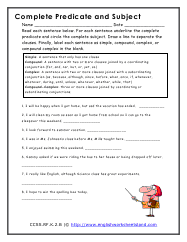Types of Sentences Worksheets:
Finish It Right - Add the correct punctuation and then name the type of format (interrogative, imperative, exclamatory, or declarative) that is used. Yeah, I'll finish it.
Complete Predicate and Subject - You have a couple of things to do here. Draw a line to separate the clauses. Finally, label each type as simple, compound, complex, or compound complex in the blank.
Type Identification - Ask yourself how the punctuation looks and go from there. Decide on the form that is used in each.
Tag the Sentence - What tag should appear here? In each blank write whether the format used is best classified as declarative, exclamatory, or interrogative.
Check Gets the Mark - What kind of mark is here? Are you looking at a compound or simple form.
Circle It Up... - Circle if it is interrogative, imperative, exclamatory, or declarative. Also do not forget to decide what punctuation is missing.
Simple, Complex, and Compound - There is more than one task for this worksheet. You have seen these types of exercises before.
Why Is It? - What type of sentence is it? Then tell us why you think that is true.
Label It - Which label fits here? Write that on all of the blanks.
Compound or Simple - Mark the correct box to show whether each sentence is a compound or simple sentence.
Add It In... - Add the missing end punctuation to each sentence and then write what kind of sentence is shown: statement, question, command, exclamation.
Choose The Correction - What will you need to correct here? You will also need to classify all the statements.
Compound Sentences - A compound sentence has two independent clauses that could stand alone as separate sentences.
It's Just Be-Clause... - Circle 2-3 sentences and make it work for the outcome. You may need to read them aloud to yourself.
Mark the Sentences - On the back of your paper write your own complex, compound, and simple sentences.
Ending It Off - Read each stretch of the text. Circle the correct ending punctuation based on the content that is presented to you.
Classify Them - In this exercise you will evaluate things as a whole.
Compose - Choose one of the subjects that are provided and use all these different styles that we have explored and write in that manner.
What Kind - Is it a declarative (D), interrogative (INT), imperative (IMP), or exclamatory (E)? Write your answer on the line. Add punctuation to extend this skill even more.
Order That - Unscramble the sentences below. Write each unscrambled sentence on the line. Use correct punctuation.
Picture to Words - How would you bring this picture to words?
One or the Other - How does each of these read to you? Classify each of them.
Change Your Stance - You will change the complete take on each statement that you are presented with.
Simple to Complex - Why not just complicate everything that you are given?
Compound or Complex? - Classify everything that you are given and make sense of them.
What's That? - This is another way for you to arrange and sort all of these statements.
On the Line - This makes for a good review of this topic.
This or That - I would use this worksheet when starting to introduce this topic. It will quickly tell you if students understand it.
City Life - You will write about a city scene or city life using all that you have learned in this section.
Bigger Everytime - You will ramp up something that is presented in a simple form to you.
Related Worksheets
Affirmatives - These are statements that are all for agreement and validation.
Commands - The goal here is to make a statement that the audience will follow and comply with.
Interrogatives and Declaratives - The dead give away between these two is the end punctuation mark.
Sentence Types - This series is filled with less complex worksheets that start this skill at the lowest level.
Wh- Questions - These are questions that are often posed to gather as much information as possible.
Get FREE English Worksheets In Your Email

